4-H Water Quality Day With Cape Fear River Watch
go.ncsu.edu/readext?927299
en Español / em Português
El inglés es el idioma de control de esta página. En la medida en que haya algún conflicto entre la traducción al inglés y la traducción, el inglés prevalece.
Al hacer clic en el enlace de traducción se activa un servicio de traducción gratuito para convertir la página al español. Al igual que con cualquier traducción por Internet, la conversión no es sensible al contexto y puede que no traduzca el texto en su significado original. NC State Extension no garantiza la exactitud del texto traducido. Por favor, tenga en cuenta que algunas aplicaciones y/o servicios pueden no funcionar como se espera cuando se traducen.
Português
Inglês é o idioma de controle desta página. Na medida que haja algum conflito entre o texto original em Inglês e a tradução, o Inglês prevalece.
Ao clicar no link de tradução, um serviço gratuito de tradução será ativado para converter a página para o Português. Como em qualquer tradução pela internet, a conversão não é sensivel ao contexto e pode não ocorrer a tradução para o significado orginal. O serviço de Extensão da Carolina do Norte (NC State Extension) não garante a exatidão do texto traduzido. Por favor, observe que algumas funções ou serviços podem não funcionar como esperado após a tradução.
English
English is the controlling language of this page. To the extent there is any conflict between the English text and the translation, English controls.
Clicking on the translation link activates a free translation service to convert the page to Spanish. As with any Internet translation, the conversion is not context-sensitive and may not translate the text to its original meaning. NC State Extension does not guarantee the accuracy of the translated text. Please note that some applications and/or services may not function as expected when translated.
Collapse ▲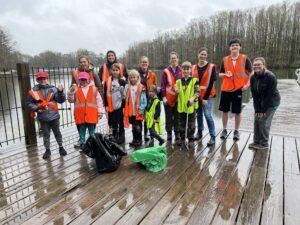 This month, several of our 4-H members and families went out to Greenfield Lake in Wilmington NC. to volunteer with Cape Fear River Watch and perform a trash cleanup and water quality testing. We spent the drizzly Saturday morning cleaning up approximately 30 lbs of trash in 45 minutes!
This month, several of our 4-H members and families went out to Greenfield Lake in Wilmington NC. to volunteer with Cape Fear River Watch and perform a trash cleanup and water quality testing. We spent the drizzly Saturday morning cleaning up approximately 30 lbs of trash in 45 minutes!
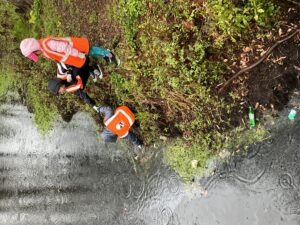
During the clean-up, 4-H members had the opportunity to collect water samples along the way at different areas of the lake. Once the rain started we packed up the samples and headed to the Cape Fear River Watch lab where we prepared the water samples for analysis. Our 4-H members did a great job making the solution, pouring it into the analysis bag, and placing them in specialized incubators for 24hrs for the bacteria to grow, if present. There the samples were tested for E. Coli Bacteria concentration by observing the prepared samples under a black light machine.
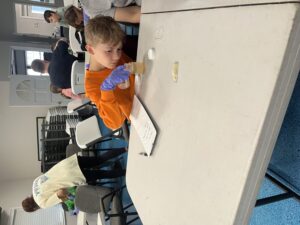
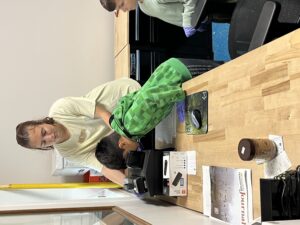
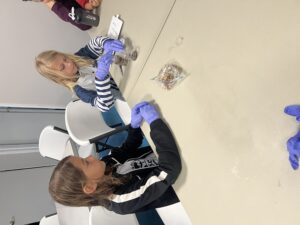
Kristen Rhodes with Cape Fear River Watch reported these numbers once the samples were analyzed the following day:

Of the 5 samples taken at Greenfield Lake, all 5 failed to pass safe standards of bacteria. This means that Greenfield Lake has an elevated amount of E.coli bacteria in it. For Freshwater (all of the Greenfield Lake samples) a passing score is anything that is less than or equal to 234 mpn. The mpn stands for the most probable number of bacteria colonies forming in a 100ml sample, which is how big our samples were. The results from the samples taken by our 4-H’ers have E.coli bacterial levels ranging from 770 mpn to over 2419.6 mpn!
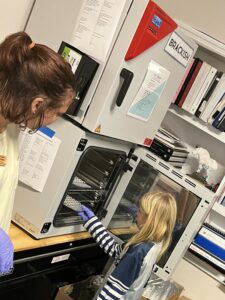
The reason bacteria levels in Greenfield Lake are so high is because of polluted storm water draining into Greenfield Lake. Often when it rains around Greenfield Lake the storm water that is polluted with bacteria from pet waste, trash, etc., drains into the lake and makes water quality worse. Along with this, when we go periods of time without any rain, the lake becomes stagnant. This allows for bacteria to grow with nothing competing against it or stopping it from happening. There are things we can do to prevent pollution from entering our waters in the first place. The first biggest thing we can do is pick up our pet’s waste to prevent it from washing into our local ponds and streams when it rains. The second biggest thing we can do to help is by disposing of our trash appropriately and encouraging others to do the same.
Thank you to all the 4-H Families who attended and helped work to keep our water clean!
To learn more about New Hanover County 4-H, contact New Hanover County Extension/4-Hat 910-798-7675, email Elizabeth_stratton@ncsu.edu or visit our website at newhanover.ces.ncsu.edu and like us on Facebook at New Hanover County 4-H or stop by to see us at 6206 Oleander Drive, Wilmington, NC.




